Business and Corporate Law: Case Study Analysis and Legal Principles
VerifiedAdded on 2020/04/15
|10
|1946
|294
Case Study
AI Summary
This assignment presents three case studies related to business and corporate law. The first case examines a partnership dispute involving a car purchase exceeding the agreed-upon limit, exploring partnership obligations and the actions of partners. The second case involves a company selling a moisturizer with false advertising, and a scenario where a partner sells a car to an individual who doesn't understand English, exploring consumer protection and contract law principles. The final case study involves a 20-year-old student who is promised extra payment for her work but is later denied, exploring contract law principles. The assignment analyzes the legal principles applicable to each case, including partnership law, contract law, and consumer protection, and provides conclusions based on the application of these principles.
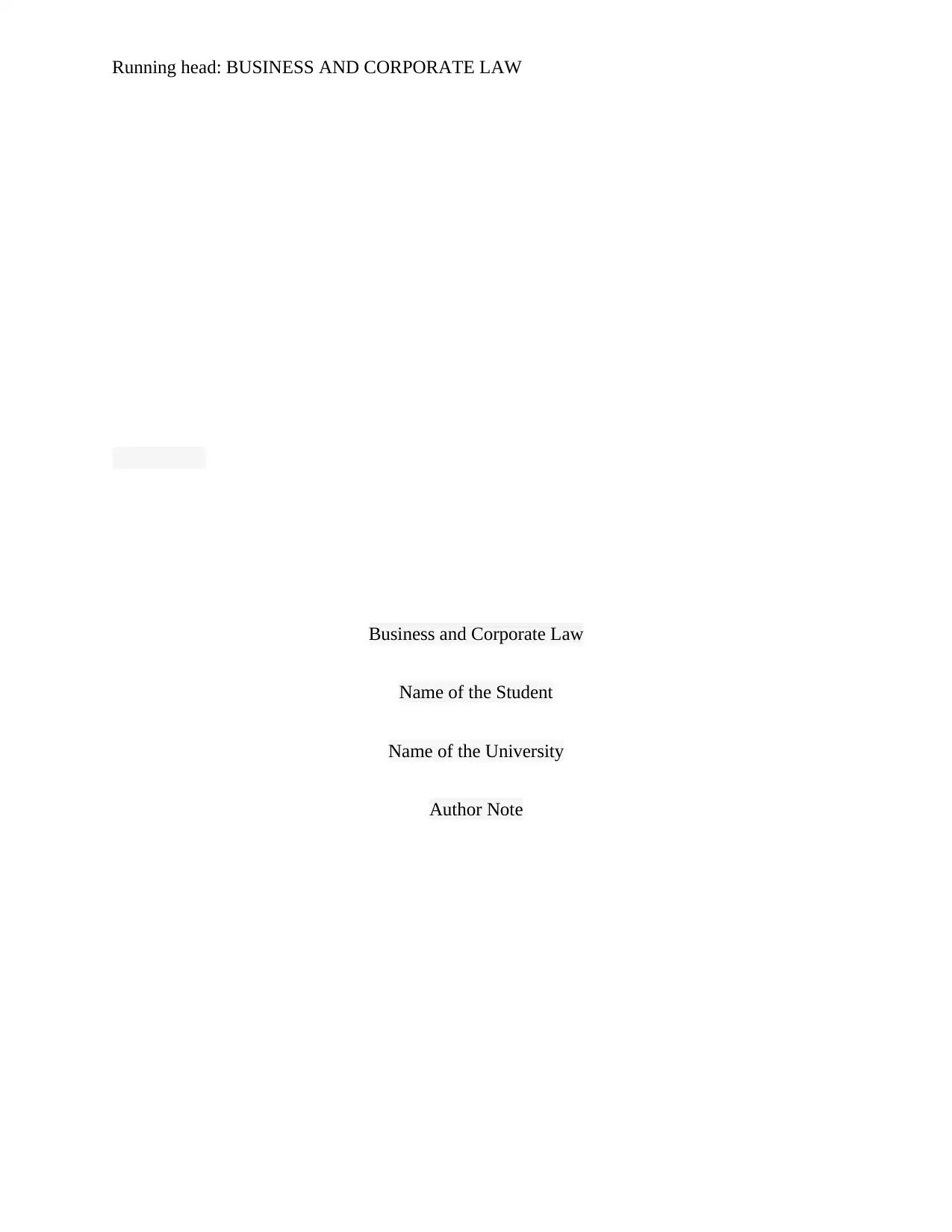
Running head: BUSINESS AND CORPORATE LAW
Business and Corporate Law
Name of the Student
Name of the University
Author Note
Business and Corporate Law
Name of the Student
Name of the University
Author Note
Paraphrase This Document
Need a fresh take? Get an instant paraphrase of this document with our AI Paraphraser
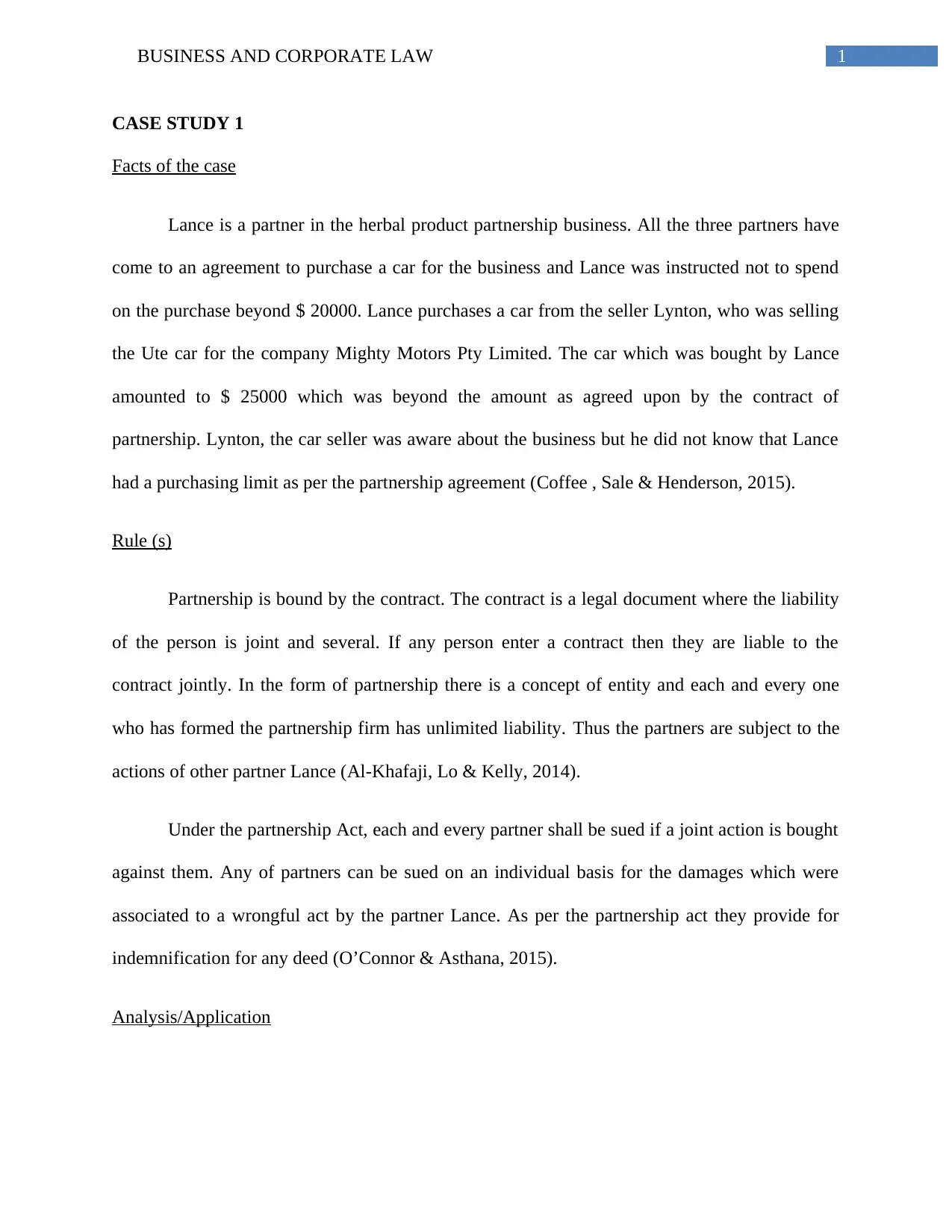
1BUSINESS AND CORPORATE LAW
CASE STUDY 1
Facts of the case
Lance is a partner in the herbal product partnership business. All the three partners have
come to an agreement to purchase a car for the business and Lance was instructed not to spend
on the purchase beyond $ 20000. Lance purchases a car from the seller Lynton, who was selling
the Ute car for the company Mighty Motors Pty Limited. The car which was bought by Lance
amounted to $ 25000 which was beyond the amount as agreed upon by the contract of
partnership. Lynton, the car seller was aware about the business but he did not know that Lance
had a purchasing limit as per the partnership agreement (Coffee , Sale & Henderson, 2015).
Rule (s)
Partnership is bound by the contract. The contract is a legal document where the liability
of the person is joint and several. If any person enter a contract then they are liable to the
contract jointly. In the form of partnership there is a concept of entity and each and every one
who has formed the partnership firm has unlimited liability. Thus the partners are subject to the
actions of other partner Lance (Al-Khafaji, Lo & Kelly, 2014).
Under the partnership Act, each and every partner shall be sued if a joint action is bought
against them. Any of partners can be sued on an individual basis for the damages which were
associated to a wrongful act by the partner Lance. As per the partnership act they provide for
indemnification for any deed (O’Connor & Asthana, 2015).
Analysis/Application
CASE STUDY 1
Facts of the case
Lance is a partner in the herbal product partnership business. All the three partners have
come to an agreement to purchase a car for the business and Lance was instructed not to spend
on the purchase beyond $ 20000. Lance purchases a car from the seller Lynton, who was selling
the Ute car for the company Mighty Motors Pty Limited. The car which was bought by Lance
amounted to $ 25000 which was beyond the amount as agreed upon by the contract of
partnership. Lynton, the car seller was aware about the business but he did not know that Lance
had a purchasing limit as per the partnership agreement (Coffee , Sale & Henderson, 2015).
Rule (s)
Partnership is bound by the contract. The contract is a legal document where the liability
of the person is joint and several. If any person enter a contract then they are liable to the
contract jointly. In the form of partnership there is a concept of entity and each and every one
who has formed the partnership firm has unlimited liability. Thus the partners are subject to the
actions of other partner Lance (Al-Khafaji, Lo & Kelly, 2014).
Under the partnership Act, each and every partner shall be sued if a joint action is bought
against them. Any of partners can be sued on an individual basis for the damages which were
associated to a wrongful act by the partner Lance. As per the partnership act they provide for
indemnification for any deed (O’Connor & Asthana, 2015).
Analysis/Application
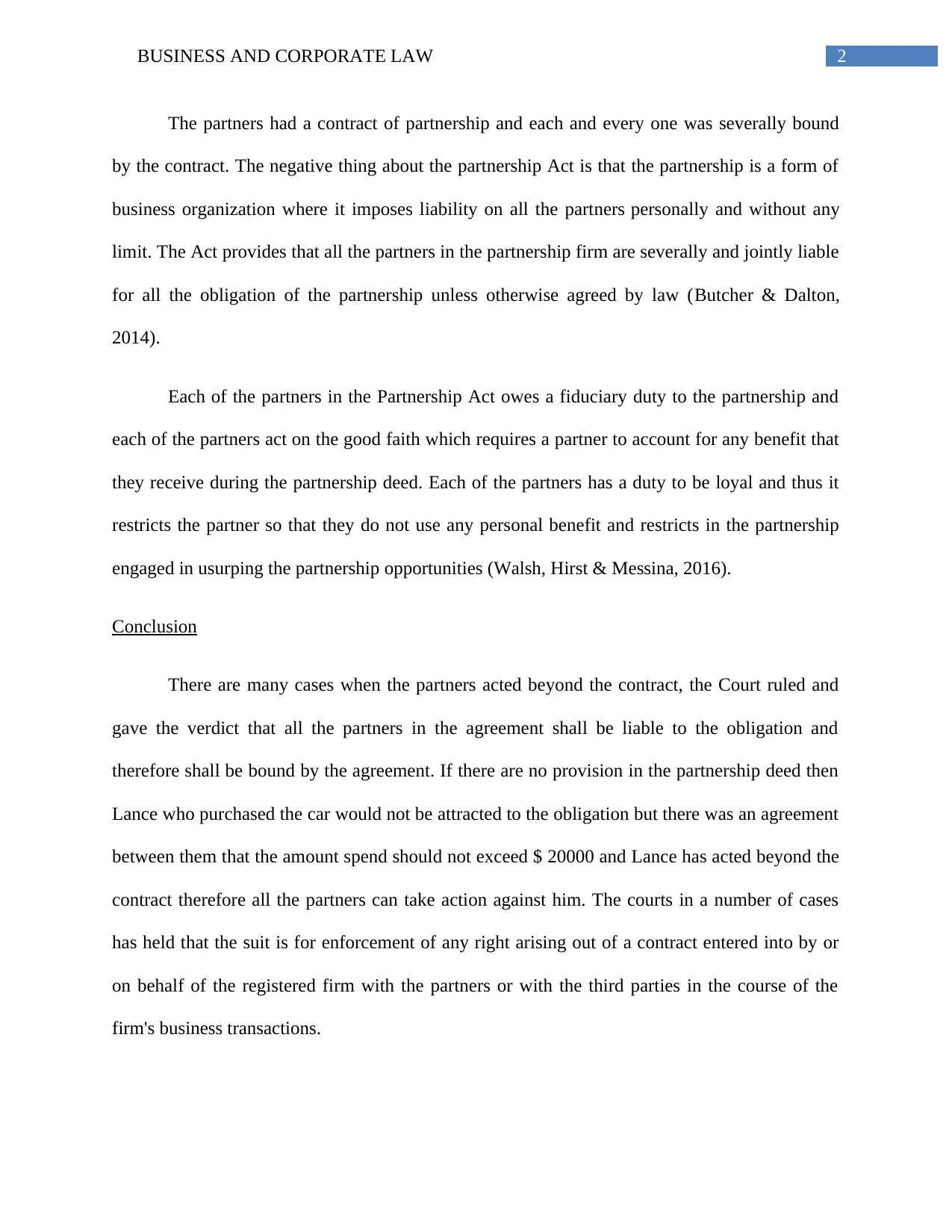
2BUSINESS AND CORPORATE LAW
The partners had a contract of partnership and each and every one was severally bound
by the contract. The negative thing about the partnership Act is that the partnership is a form of
business organization where it imposes liability on all the partners personally and without any
limit. The Act provides that all the partners in the partnership firm are severally and jointly liable
for all the obligation of the partnership unless otherwise agreed by law (Butcher & Dalton,
2014).
Each of the partners in the Partnership Act owes a fiduciary duty to the partnership and
each of the partners act on the good faith which requires a partner to account for any benefit that
they receive during the partnership deed. Each of the partners has a duty to be loyal and thus it
restricts the partner so that they do not use any personal benefit and restricts in the partnership
engaged in usurping the partnership opportunities (Walsh, Hirst & Messina, 2016).
Conclusion
There are many cases when the partners acted beyond the contract, the Court ruled and
gave the verdict that all the partners in the agreement shall be liable to the obligation and
therefore shall be bound by the agreement. If there are no provision in the partnership deed then
Lance who purchased the car would not be attracted to the obligation but there was an agreement
between them that the amount spend should not exceed $ 20000 and Lance has acted beyond the
contract therefore all the partners can take action against him. The courts in a number of cases
has held that the suit is for enforcement of any right arising out of a contract entered into by or
on behalf of the registered firm with the partners or with the third parties in the course of the
firm's business transactions.
The partners had a contract of partnership and each and every one was severally bound
by the contract. The negative thing about the partnership Act is that the partnership is a form of
business organization where it imposes liability on all the partners personally and without any
limit. The Act provides that all the partners in the partnership firm are severally and jointly liable
for all the obligation of the partnership unless otherwise agreed by law (Butcher & Dalton,
2014).
Each of the partners in the Partnership Act owes a fiduciary duty to the partnership and
each of the partners act on the good faith which requires a partner to account for any benefit that
they receive during the partnership deed. Each of the partners has a duty to be loyal and thus it
restricts the partner so that they do not use any personal benefit and restricts in the partnership
engaged in usurping the partnership opportunities (Walsh, Hirst & Messina, 2016).
Conclusion
There are many cases when the partners acted beyond the contract, the Court ruled and
gave the verdict that all the partners in the agreement shall be liable to the obligation and
therefore shall be bound by the agreement. If there are no provision in the partnership deed then
Lance who purchased the car would not be attracted to the obligation but there was an agreement
between them that the amount spend should not exceed $ 20000 and Lance has acted beyond the
contract therefore all the partners can take action against him. The courts in a number of cases
has held that the suit is for enforcement of any right arising out of a contract entered into by or
on behalf of the registered firm with the partners or with the third parties in the course of the
firm's business transactions.
⊘ This is a preview!⊘
Do you want full access?
Subscribe today to unlock all pages.

Trusted by 1+ million students worldwide
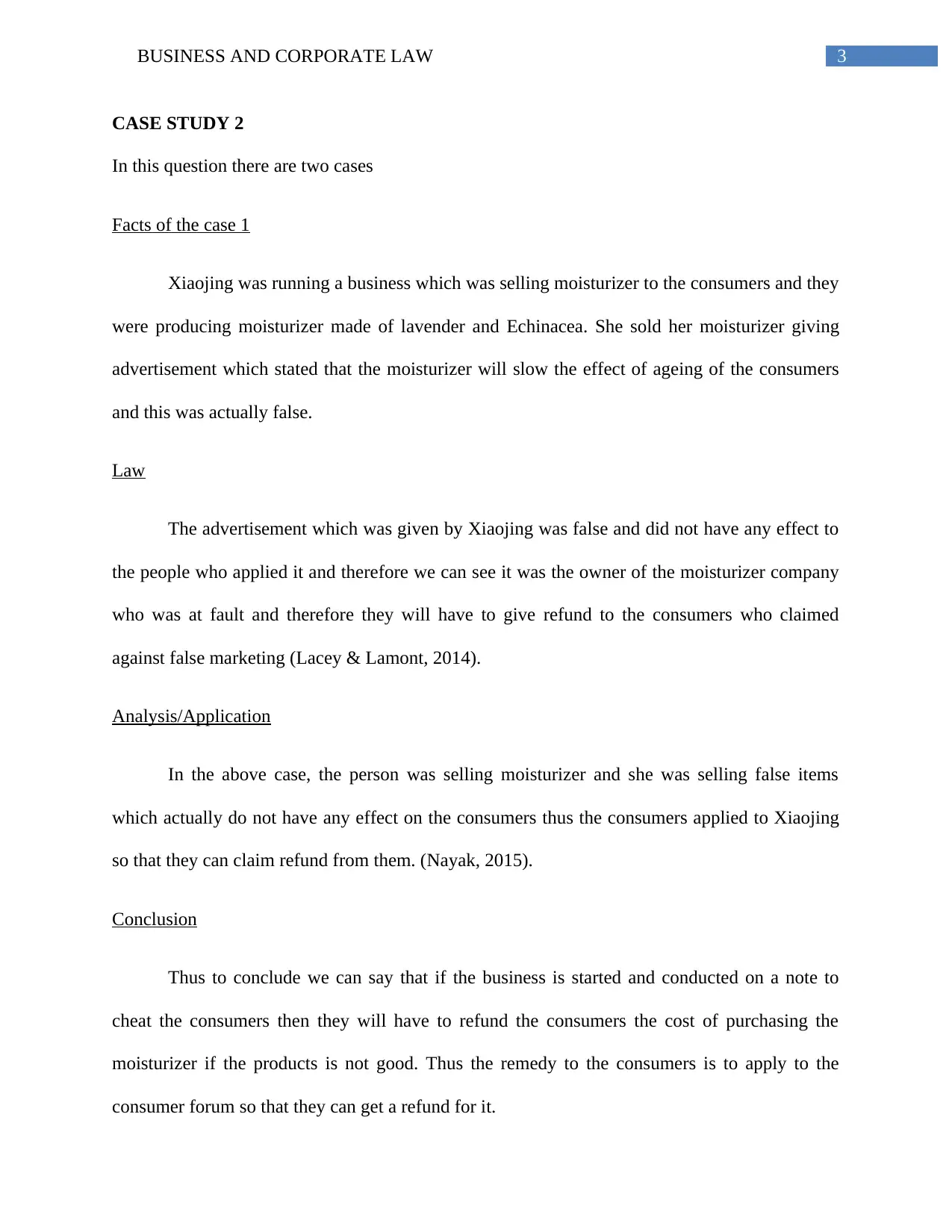
3BUSINESS AND CORPORATE LAW
CASE STUDY 2
In this question there are two cases
Facts of the case 1
Xiaojing was running a business which was selling moisturizer to the consumers and they
were producing moisturizer made of lavender and Echinacea. She sold her moisturizer giving
advertisement which stated that the moisturizer will slow the effect of ageing of the consumers
and this was actually false.
Law
The advertisement which was given by Xiaojing was false and did not have any effect to
the people who applied it and therefore we can see it was the owner of the moisturizer company
who was at fault and therefore they will have to give refund to the consumers who claimed
against false marketing (Lacey & Lamont, 2014).
Analysis/Application
In the above case, the person was selling moisturizer and she was selling false items
which actually do not have any effect on the consumers thus the consumers applied to Xiaojing
so that they can claim refund from them. (Nayak, 2015).
Conclusion
Thus to conclude we can say that if the business is started and conducted on a note to
cheat the consumers then they will have to refund the consumers the cost of purchasing the
moisturizer if the products is not good. Thus the remedy to the consumers is to apply to the
consumer forum so that they can get a refund for it.
CASE STUDY 2
In this question there are two cases
Facts of the case 1
Xiaojing was running a business which was selling moisturizer to the consumers and they
were producing moisturizer made of lavender and Echinacea. She sold her moisturizer giving
advertisement which stated that the moisturizer will slow the effect of ageing of the consumers
and this was actually false.
Law
The advertisement which was given by Xiaojing was false and did not have any effect to
the people who applied it and therefore we can see it was the owner of the moisturizer company
who was at fault and therefore they will have to give refund to the consumers who claimed
against false marketing (Lacey & Lamont, 2014).
Analysis/Application
In the above case, the person was selling moisturizer and she was selling false items
which actually do not have any effect on the consumers thus the consumers applied to Xiaojing
so that they can claim refund from them. (Nayak, 2015).
Conclusion
Thus to conclude we can say that if the business is started and conducted on a note to
cheat the consumers then they will have to refund the consumers the cost of purchasing the
moisturizer if the products is not good. Thus the remedy to the consumers is to apply to the
consumer forum so that they can get a refund for it.
Paraphrase This Document
Need a fresh take? Get an instant paraphrase of this document with our AI Paraphraser
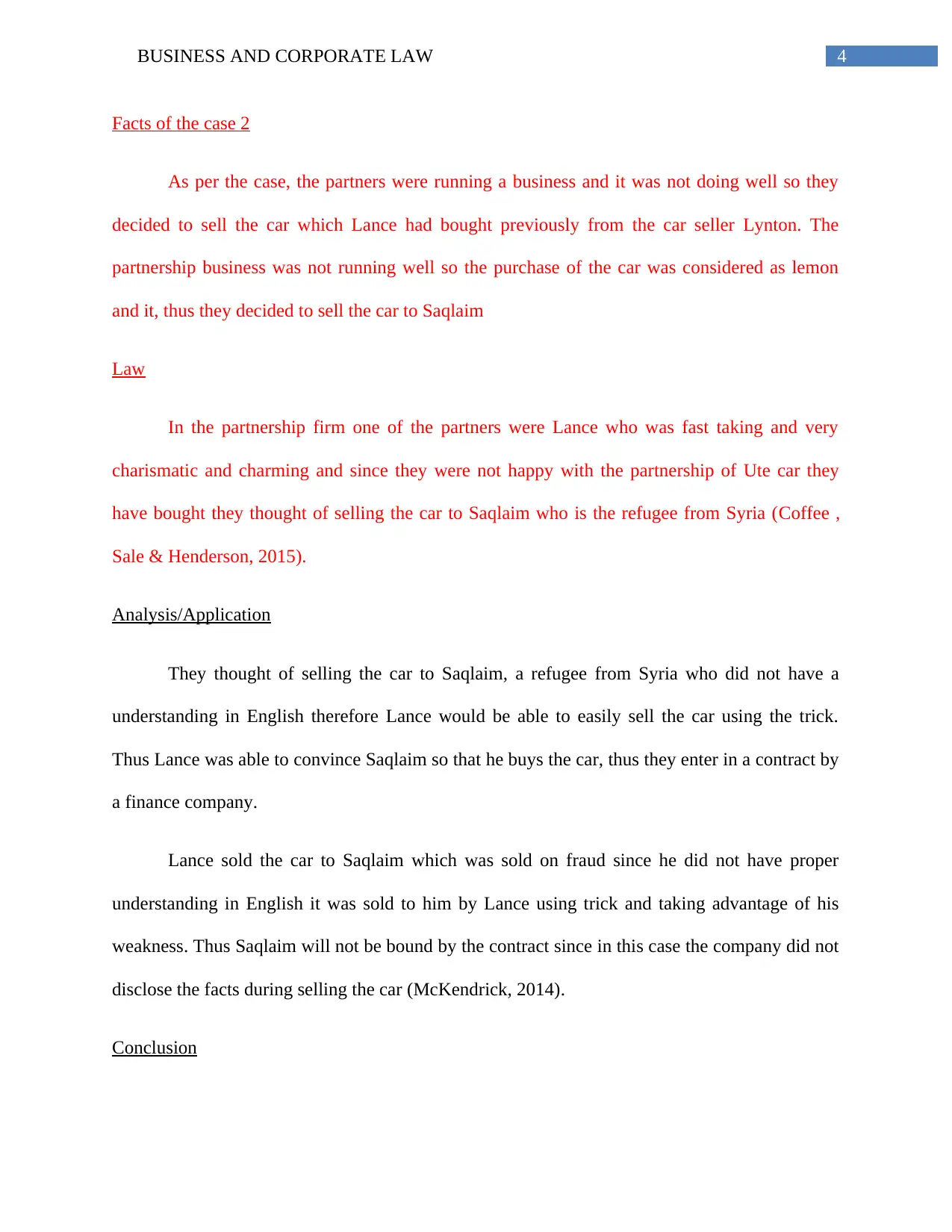
4BUSINESS AND CORPORATE LAW
Facts of the case 2
As per the case, the partners were running a business and it was not doing well so they
decided to sell the car which Lance had bought previously from the car seller Lynton. The
partnership business was not running well so the purchase of the car was considered as lemon
and it, thus they decided to sell the car to Saqlaim
Law
In the partnership firm one of the partners were Lance who was fast taking and very
charismatic and charming and since they were not happy with the partnership of Ute car they
have bought they thought of selling the car to Saqlaim who is the refugee from Syria (Coffee ,
Sale & Henderson, 2015).
Analysis/Application
They thought of selling the car to Saqlaim, a refugee from Syria who did not have a
understanding in English therefore Lance would be able to easily sell the car using the trick.
Thus Lance was able to convince Saqlaim so that he buys the car, thus they enter in a contract by
a finance company.
Lance sold the car to Saqlaim which was sold on fraud since he did not have proper
understanding in English it was sold to him by Lance using trick and taking advantage of his
weakness. Thus Saqlaim will not be bound by the contract since in this case the company did not
disclose the facts during selling the car (McKendrick, 2014).
Conclusion
Facts of the case 2
As per the case, the partners were running a business and it was not doing well so they
decided to sell the car which Lance had bought previously from the car seller Lynton. The
partnership business was not running well so the purchase of the car was considered as lemon
and it, thus they decided to sell the car to Saqlaim
Law
In the partnership firm one of the partners were Lance who was fast taking and very
charismatic and charming and since they were not happy with the partnership of Ute car they
have bought they thought of selling the car to Saqlaim who is the refugee from Syria (Coffee ,
Sale & Henderson, 2015).
Analysis/Application
They thought of selling the car to Saqlaim, a refugee from Syria who did not have a
understanding in English therefore Lance would be able to easily sell the car using the trick.
Thus Lance was able to convince Saqlaim so that he buys the car, thus they enter in a contract by
a finance company.
Lance sold the car to Saqlaim which was sold on fraud since he did not have proper
understanding in English it was sold to him by Lance using trick and taking advantage of his
weakness. Thus Saqlaim will not be bound by the contract since in this case the company did not
disclose the facts during selling the car (McKendrick, 2014).
Conclusion
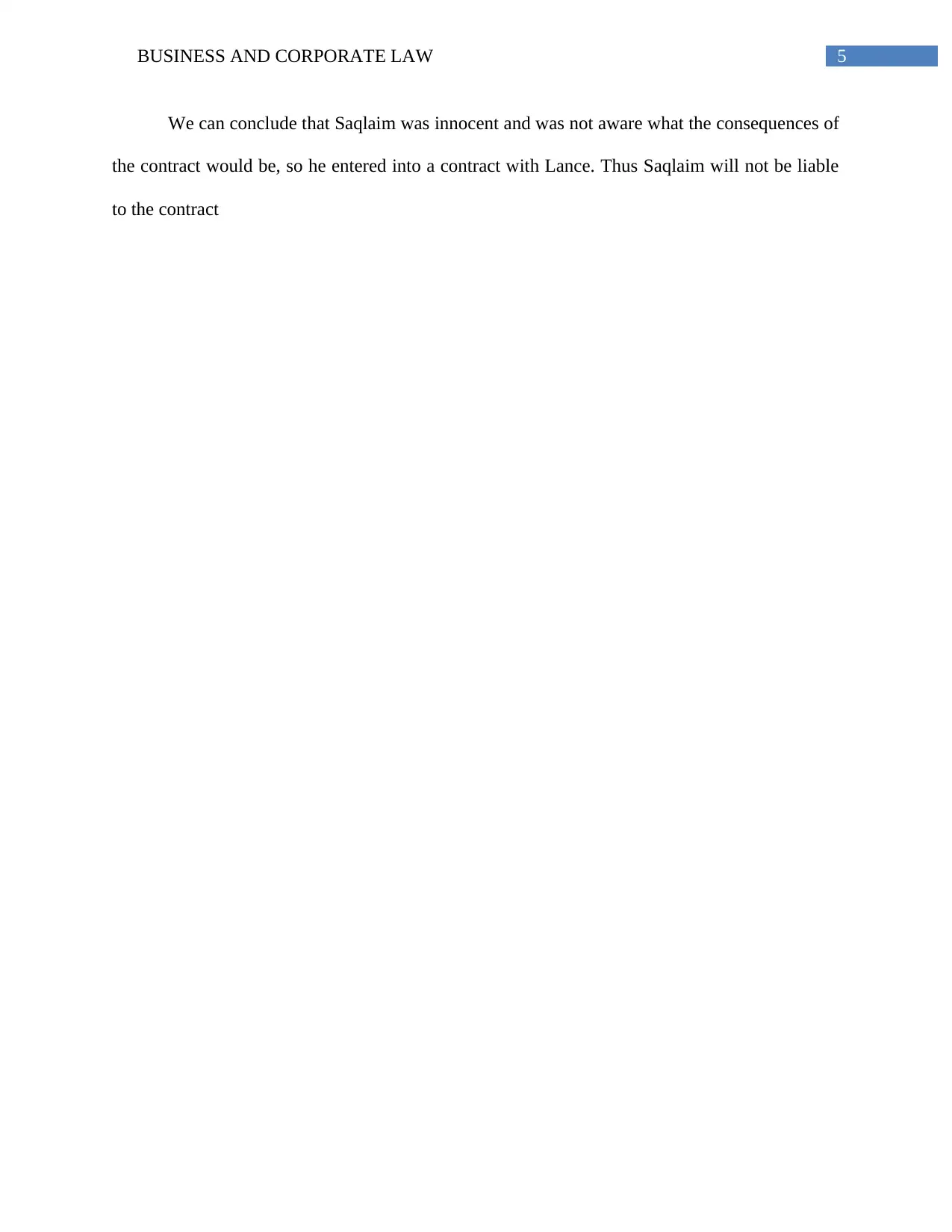
5BUSINESS AND CORPORATE LAW
We can conclude that Saqlaim was innocent and was not aware what the consequences of
the contract would be, so he entered into a contract with Lance. Thus Saqlaim will not be liable
to the contract
We can conclude that Saqlaim was innocent and was not aware what the consequences of
the contract would be, so he entered into a contract with Lance. Thus Saqlaim will not be liable
to the contract
⊘ This is a preview!⊘
Do you want full access?
Subscribe today to unlock all pages.

Trusted by 1+ million students worldwide
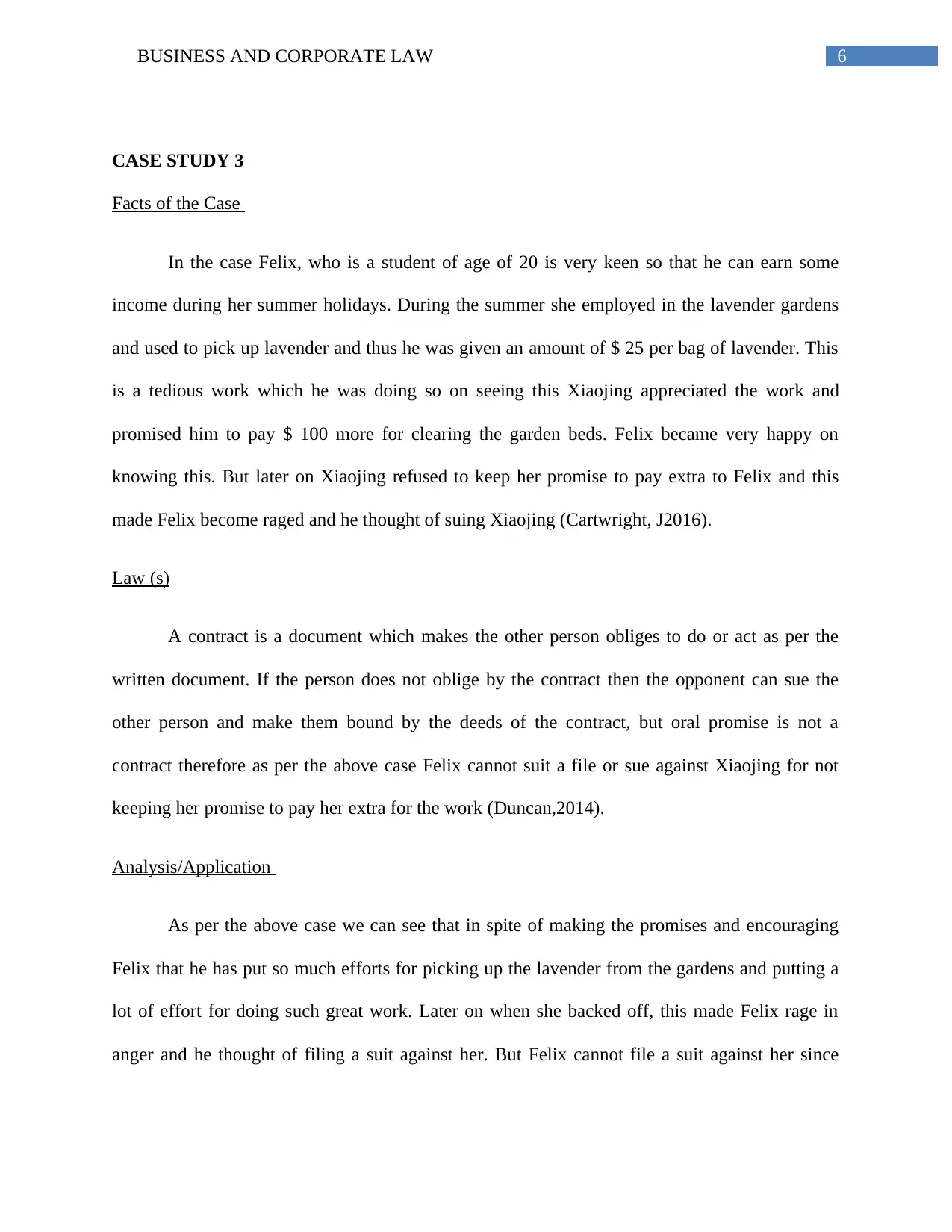
6BUSINESS AND CORPORATE LAW
CASE STUDY 3
Facts of the Case
In the case Felix, who is a student of age of 20 is very keen so that he can earn some
income during her summer holidays. During the summer she employed in the lavender gardens
and used to pick up lavender and thus he was given an amount of $ 25 per bag of lavender. This
is a tedious work which he was doing so on seeing this Xiaojing appreciated the work and
promised him to pay $ 100 more for clearing the garden beds. Felix became very happy on
knowing this. But later on Xiaojing refused to keep her promise to pay extra to Felix and this
made Felix become raged and he thought of suing Xiaojing (Cartwright, J2016).
Law (s)
A contract is a document which makes the other person obliges to do or act as per the
written document. If the person does not oblige by the contract then the opponent can sue the
other person and make them bound by the deeds of the contract, but oral promise is not a
contract therefore as per the above case Felix cannot suit a file or sue against Xiaojing for not
keeping her promise to pay her extra for the work (Duncan,2014).
Analysis/Application
As per the above case we can see that in spite of making the promises and encouraging
Felix that he has put so much efforts for picking up the lavender from the gardens and putting a
lot of effort for doing such great work. Later on when she backed off, this made Felix rage in
anger and he thought of filing a suit against her. But Felix cannot file a suit against her since
CASE STUDY 3
Facts of the Case
In the case Felix, who is a student of age of 20 is very keen so that he can earn some
income during her summer holidays. During the summer she employed in the lavender gardens
and used to pick up lavender and thus he was given an amount of $ 25 per bag of lavender. This
is a tedious work which he was doing so on seeing this Xiaojing appreciated the work and
promised him to pay $ 100 more for clearing the garden beds. Felix became very happy on
knowing this. But later on Xiaojing refused to keep her promise to pay extra to Felix and this
made Felix become raged and he thought of suing Xiaojing (Cartwright, J2016).
Law (s)
A contract is a document which makes the other person obliges to do or act as per the
written document. If the person does not oblige by the contract then the opponent can sue the
other person and make them bound by the deeds of the contract, but oral promise is not a
contract therefore as per the above case Felix cannot suit a file or sue against Xiaojing for not
keeping her promise to pay her extra for the work (Duncan,2014).
Analysis/Application
As per the above case we can see that in spite of making the promises and encouraging
Felix that he has put so much efforts for picking up the lavender from the gardens and putting a
lot of effort for doing such great work. Later on when she backed off, this made Felix rage in
anger and he thought of filing a suit against her. But Felix cannot file a suit against her since
Paraphrase This Document
Need a fresh take? Get an instant paraphrase of this document with our AI Paraphraser
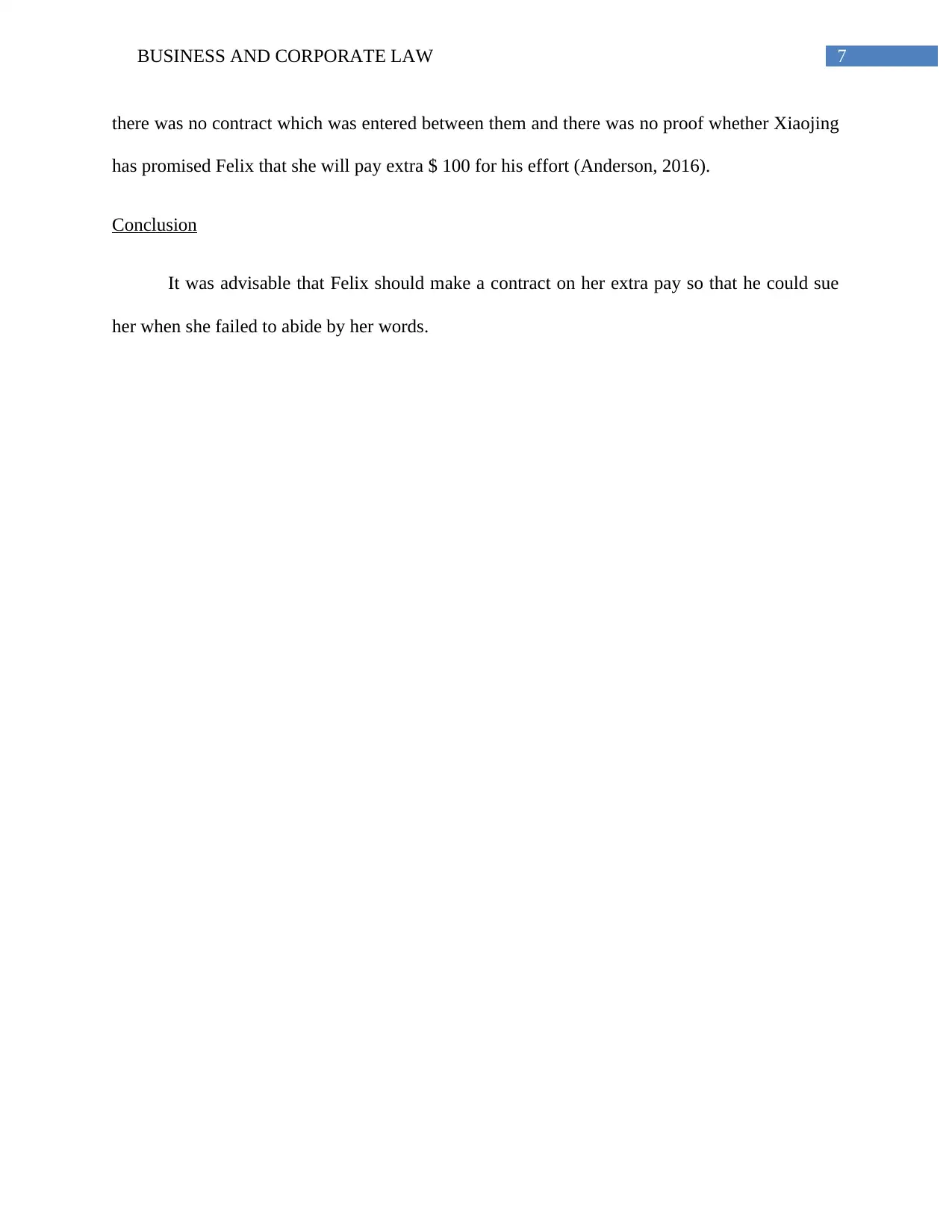
7BUSINESS AND CORPORATE LAW
there was no contract which was entered between them and there was no proof whether Xiaojing
has promised Felix that she will pay extra $ 100 for his effort (Anderson, 2016).
Conclusion
It was advisable that Felix should make a contract on her extra pay so that he could sue
her when she failed to abide by her words.
there was no contract which was entered between them and there was no proof whether Xiaojing
has promised Felix that she will pay extra $ 100 for his effort (Anderson, 2016).
Conclusion
It was advisable that Felix should make a contract on her extra pay so that he could sue
her when she failed to abide by her words.
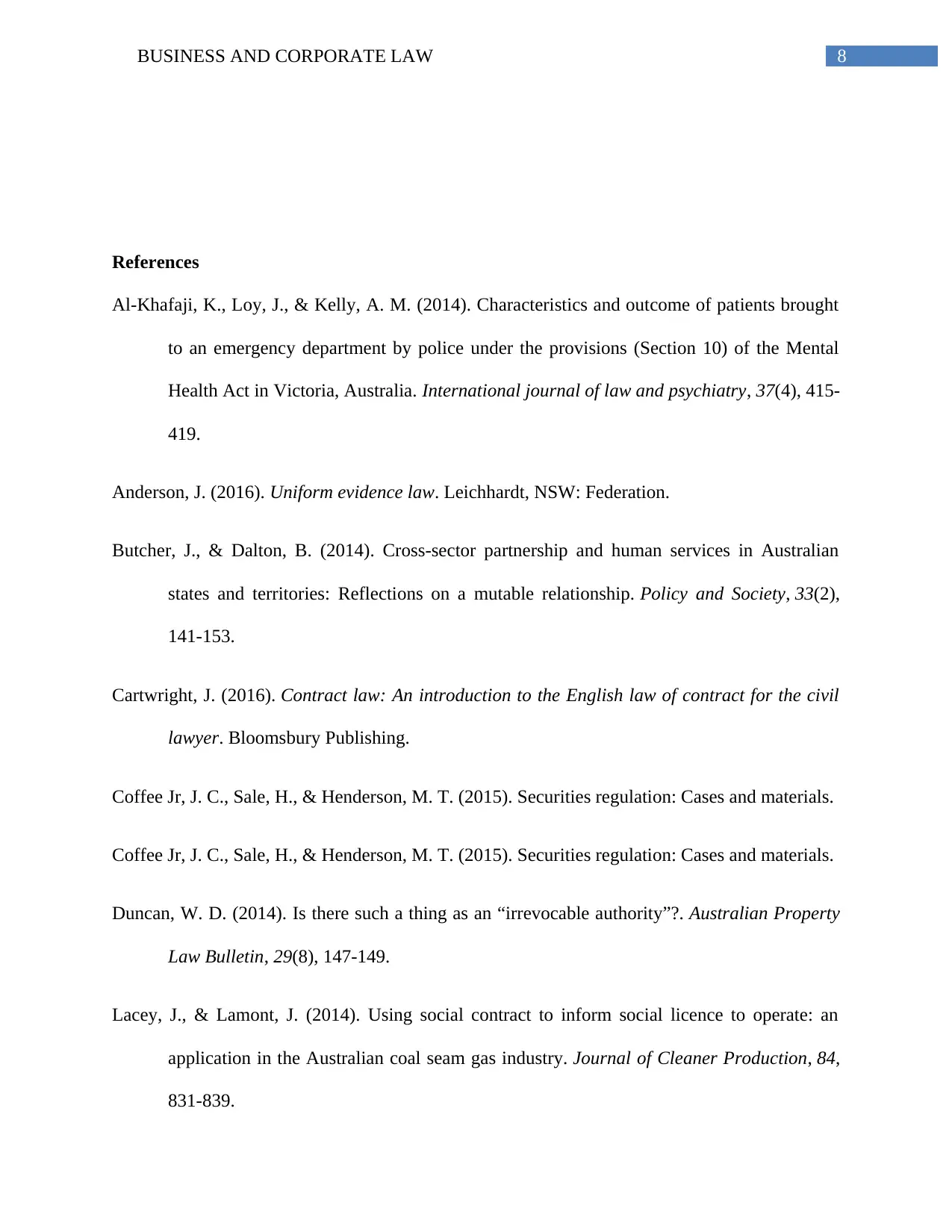
8BUSINESS AND CORPORATE LAW
References
Al-Khafaji, K., Loy, J., & Kelly, A. M. (2014). Characteristics and outcome of patients brought
to an emergency department by police under the provisions (Section 10) of the Mental
Health Act in Victoria, Australia. International journal of law and psychiatry, 37(4), 415-
419.
Anderson, J. (2016). Uniform evidence law. Leichhardt, NSW: Federation.
Butcher, J., & Dalton, B. (2014). Cross-sector partnership and human services in Australian
states and territories: Reflections on a mutable relationship. Policy and Society, 33(2),
141-153.
Cartwright, J. (2016). Contract law: An introduction to the English law of contract for the civil
lawyer. Bloomsbury Publishing.
Coffee Jr, J. C., Sale, H., & Henderson, M. T. (2015). Securities regulation: Cases and materials.
Coffee Jr, J. C., Sale, H., & Henderson, M. T. (2015). Securities regulation: Cases and materials.
Duncan, W. D. (2014). Is there such a thing as an “irrevocable authority”?. Australian Property
Law Bulletin, 29(8), 147-149.
Lacey, J., & Lamont, J. (2014). Using social contract to inform social licence to operate: an
application in the Australian coal seam gas industry. Journal of Cleaner Production, 84,
831-839.
References
Al-Khafaji, K., Loy, J., & Kelly, A. M. (2014). Characteristics and outcome of patients brought
to an emergency department by police under the provisions (Section 10) of the Mental
Health Act in Victoria, Australia. International journal of law and psychiatry, 37(4), 415-
419.
Anderson, J. (2016). Uniform evidence law. Leichhardt, NSW: Federation.
Butcher, J., & Dalton, B. (2014). Cross-sector partnership and human services in Australian
states and territories: Reflections on a mutable relationship. Policy and Society, 33(2),
141-153.
Cartwright, J. (2016). Contract law: An introduction to the English law of contract for the civil
lawyer. Bloomsbury Publishing.
Coffee Jr, J. C., Sale, H., & Henderson, M. T. (2015). Securities regulation: Cases and materials.
Coffee Jr, J. C., Sale, H., & Henderson, M. T. (2015). Securities regulation: Cases and materials.
Duncan, W. D. (2014). Is there such a thing as an “irrevocable authority”?. Australian Property
Law Bulletin, 29(8), 147-149.
Lacey, J., & Lamont, J. (2014). Using social contract to inform social licence to operate: an
application in the Australian coal seam gas industry. Journal of Cleaner Production, 84,
831-839.
⊘ This is a preview!⊘
Do you want full access?
Subscribe today to unlock all pages.

Trusted by 1+ million students worldwide
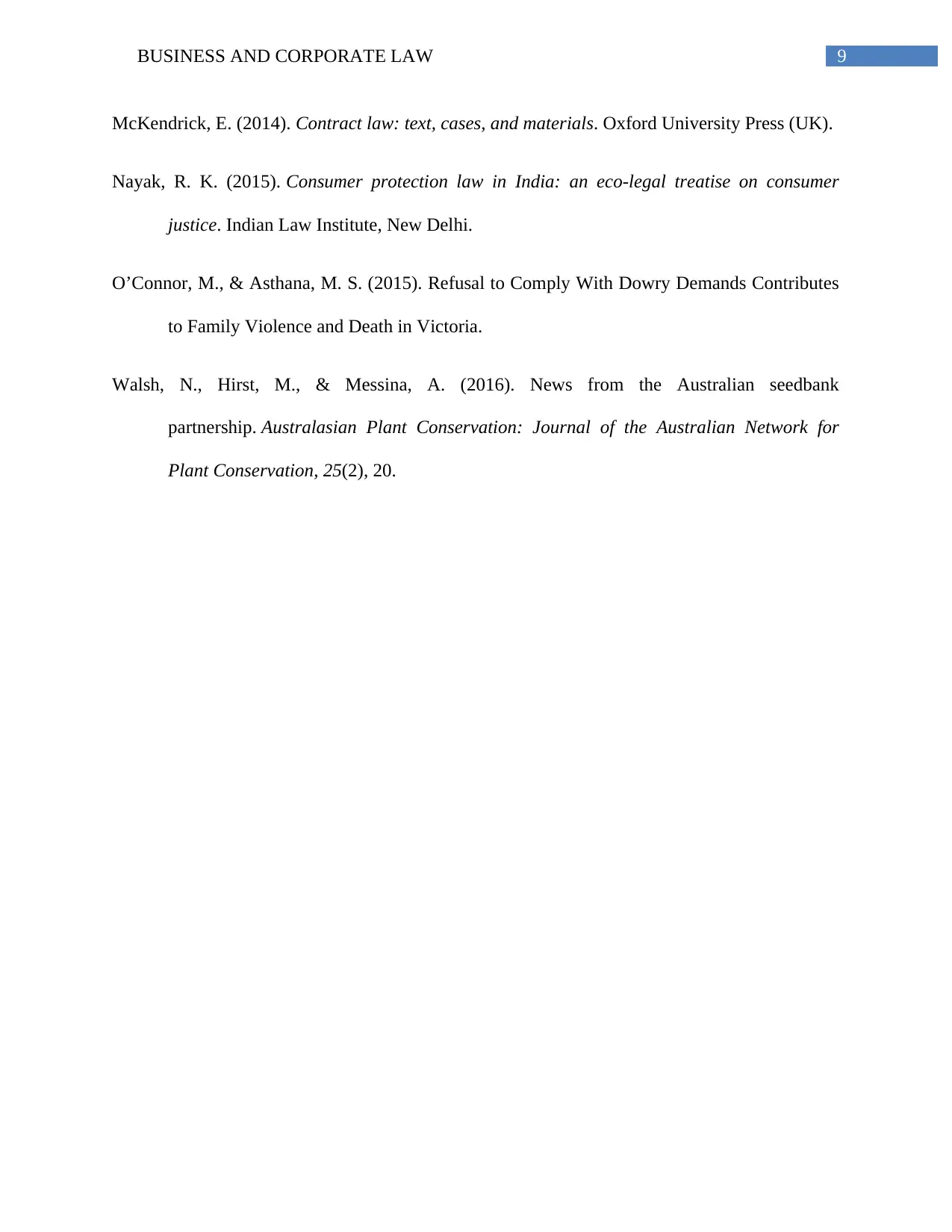
9BUSINESS AND CORPORATE LAW
McKendrick, E. (2014). Contract law: text, cases, and materials. Oxford University Press (UK).
Nayak, R. K. (2015). Consumer protection law in India: an eco-legal treatise on consumer
justice. Indian Law Institute, New Delhi.
O’Connor, M., & Asthana, M. S. (2015). Refusal to Comply With Dowry Demands Contributes
to Family Violence and Death in Victoria.
Walsh, N., Hirst, M., & Messina, A. (2016). News from the Australian seedbank
partnership. Australasian Plant Conservation: Journal of the Australian Network for
Plant Conservation, 25(2), 20.
McKendrick, E. (2014). Contract law: text, cases, and materials. Oxford University Press (UK).
Nayak, R. K. (2015). Consumer protection law in India: an eco-legal treatise on consumer
justice. Indian Law Institute, New Delhi.
O’Connor, M., & Asthana, M. S. (2015). Refusal to Comply With Dowry Demands Contributes
to Family Violence and Death in Victoria.
Walsh, N., Hirst, M., & Messina, A. (2016). News from the Australian seedbank
partnership. Australasian Plant Conservation: Journal of the Australian Network for
Plant Conservation, 25(2), 20.
1 out of 10
Related Documents
Your All-in-One AI-Powered Toolkit for Academic Success.
+13062052269
info@desklib.com
Available 24*7 on WhatsApp / Email
![[object Object]](/_next/static/media/star-bottom.7253800d.svg)
Unlock your academic potential
Copyright © 2020–2026 A2Z Services. All Rights Reserved. Developed and managed by ZUCOL.





